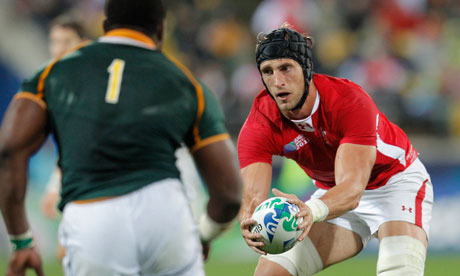
Wales are going up in the world. No doubt about it. Thursday night's team meal ahead of Saturday's semi-final was at the top of the Sky Tower – a kind of Post Office Tower with knobs on, which dominates the Auckland skyline. You feel like you're 1,000 feet in the air. And the food's not bad either. If this is the price you pay for success I could get used to it.
Who would have thought you could dine out on defence? But that's the way this tournament is going with attention increasingly on the Jackals – the Richie McCaws, David Pococks and Sam Warburtons of the World Cup, who are proving you don't have to have all the ball to win games. I know; the first time you say it, it's a bit like telling someone that water can flow up hill. But I'm prepared to give examples.
In 2004 Wasps beat Toulouse and won the Heineken Cup when it seemed as though we only had about 30% of possession. Then in the 2007 World Cup quarter-final in Cardiff, France beat New Zealand by making something like 200 tackles – pretty much a record for those like me who store such stats – but then last weekend Australia beat South Africa without hardly touching the ball the day after Wales blunted Ireland's attack.
So far in this tournament, Wales have conceded an average of eight points a game. Repeat that against France on Saturday – a big ask, as they say down here – and I'm told we will be the finalists with the lowest average in the 24 years of the cup.
More relevantly, you need to understand why rugby union is different. In the sport that I played most – rugby league – there is no way a side with 30% possession could come out on top in a game between two otherwise evenly matched sides. But in union it can be harder, more exhausting having the ball and keeping it than trying to win it.
Consider the breakdown: the attacking side frequently has to use more resources keeping the ball. There's the ball carrier, probably three guys supporting him and clearing out the ruck, plus a scrum-half to distribute the ball and keep the move going. Five players, as opposed to the defence, which may commit only the one man.
The All Blacks are a perfect example, frequently seeming not to bother at the breakdown, sending just the one or two men. Then, when they sense something's on, they pile in, rip the ball and are in perfect shape, with a broken field ahead, to launch an attack.
But then again, there are differing kinds of defence and teams have defensive strategies, just as they have planned attacking moves.
Four years ago France beat the All Blacks by double-tackling the ball carrier. They wanted to stop the Blacks' offloading game, so one man went low while the other went high, pinning the ball carrier's arms. They frustrated a big part of the All Black game and we all know what happened. It's become part of New Zealand folklore.
We play to our strengths which is a back row – Warburton, Dan Lydiate and Toby Faletau – all of whom are ball winners, plus a couple of extra Jackals from the front row in Gethin Jenkins and Huw Bennett, who are better than most when it comes to ripping and winning the ball. In effect we have five back-rowers in the pack and a few more knocking around in midfield, so we tailor our game to suit them.Against Ireland we brushed up on our leg tackling, concentrating on getting their big men to the ground quickly so the Jackals could get at them while on attack we worked on frustrating the Irish defence plan.
Ireland have had considerable success with their particular style of defence which involves keeping the ball carrier off the ground, denying the attacking side the benefits of the ruck. They are quite vocal in letting the ref know what's going on, shouting: "It's a maul, it's a maul," just in case he thought otherwise.
Our idea was to frustrate the Irish by making sure we made a decent dent in their defence while at the same time guaranteeing our guys got to ground when tackled and we used an idea which is more often seen when sides are battering away at the try line. Teams like Italy frequently get another big man to "latch on" to the ball carrier, creating a 34-stone plus unit trying to break the line and pop the ball down.
We did something similar, but in other areas of the field, ensuring there was no way the Irish could stop our guys going to ground where the tacklers had to release. Then we were playing on our terms.
It's hardly rocket science, just another part of winning games. But what worked against Ireland might not be what's planned for France. It'll be worth getting up early to find out.

